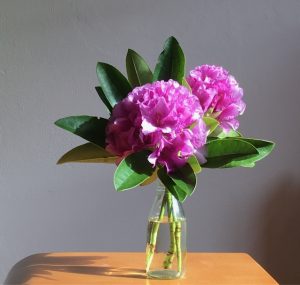Simple pleasures: living
Back in the 1990s, I stumbled upon a book on “voluntary simplicity’’. With my city practice booming, I could no long afford the time to lecture at SSNT. However, as this coincided with taking on a mortgage, was it wise to ditch my regular part-time income in favour of the ups and downs of self-employment?
As much as I loved teaching, it was sapping my energy. Spending weekends preparing for class and marking assignments wasn’t sustainable on top of a full client load. But leaving my lecturing gig felt financially scary. Was there another way? After reading the simplicity book I decided to look at what I was spending, rather than earning, as another way to take control of my finances.
Focusing on what I really enjoy doing, rather than how much cash I had to spend as a reward for hard work, revolutionised my relationship with money. Instead of creating a rigid budget (which, like diets, is based on denying yourself something you want and inevitably rebelling about the self-imposed restrictions), I looked at what I valued in my life.
Pleasures rather than cravings
Another book that influenced my choices was one on women and our relationship with money. It asserted it was important to have small pleasures in life, luxuries if you want to call them that, to stop you feel deprived.
While I was thinking about giving up my part-time lecturing, I rethought my approach to money. What did I really enjoy that was inessential but enriched my life in some way? At that time it was the freedom to eat a breakfast at a local café on the weekend and flowers to brighten my home.
Neither were essential but having pleasure sated other cravings to reward or ‘treat’ myself. I also prioritised a weekly shop at Vic Market. I loved the ritual of buying organic produce at the market. Ultimately having fresh food in the house saved me money as it was easy to cook from scratch.
I like cooking, so it’s not a chore most of the time. Finding pleasure in creating simple, quick and healthy meals reduces my craving to eat out. You might hate cooking, so for you it’s might be about having a bigger food budget for buying healthy, pre-prepared food some of the time.
It’s all about balance.
Simple pleasures
While buying organic food isn’t always the cheapest option, many simple pleasures are often free or low cost.
Here are some simple things that bring me joy:
Catching up with friend, over a cup of tea at home, a summer picnic or a walk together, sates that human desire for connection.
Growing plants, even pots on a balcony or micro sprouts on the window sill, keeps us connected with nature.
A neighbourhood project – our laneway garden started with a few planter boxes that someone was giving away. Neighbours began adding more pots and plants and over time this has extended to two blocks of guerrilla gardening! Seeing the pleasure it brings to my community, both neighbours strangers walking down the lane, multiplies the joy.
A pot of home-grown mint or lemon balm tea, or making a ‘kitchen cupboard’ spice tea with cinnamon, ginger, cardamom and a few slices of orange – is a little bit of love in a cup.
A walk in a national park always makes me feel good. One of the delightful things about moving interstate means there are so many new nature spots to explore. Sydney public transport users can travel anywhere in NSW on Sundays, for a couple of dollars, when they use an Opal card. It’s been fun exploring so many beautiful and interesting places within a couple of hours by train of the city.
A good read can transport us through the magic of writing to other worlds. Libraries make this one of the cheapest pleasures around (but they really need our patronage to stay funded, so share some love with your local library).
What are your favourite simple pleasures?
Similar Posts:
Social Share
One Comment
Leave a Reply
You must be logged in to post a comment.








Pingback: Gill Stannard » Getting inspired in the kitchen and in practice: November update